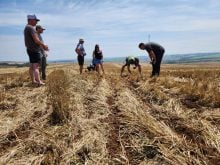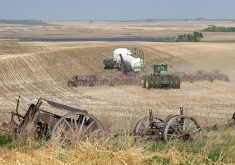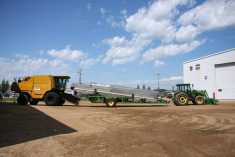VICTORIA – Scientists studying how genes work within grapevines may turn the age-old craft of wine-making on its head.
The University of British Columbia’s Wine Research Centre is leading a $3.4 million study into grape and wine genomics.
Led by UBC viticulture professor Steven Lund, the project will use genomics to identify protein biomarkers in grapevine tissue, which will help grape growers monitor how their plants respond to natural and human-made changes.
“This will put more tools in the growers’ tool boxes,” said Lund, who has a PhD in plant biological sciences from the University of Minnesota.
Read Also

Manitoba extends Crown land rent freeze
Manitoba government links the continued rental rate freeze on grazing and forage leases to economic and environmental challenges facing the industry
Genomics is the branch of molecular biology concerned with the structure, function, evolution and mapping of genomes, which are the complete set of genes or genetic material found in a cell or organism.
Lund stressed that his study does not involve genetic modification.
“We’re not altering the genome. We’re monitoring the genome.”
Now, growers check their grapes by measuring pH and sugar levels to determine when they should harvest, but usually that isn’t done until late in the growing season.
They have no way to monitor the impact of certain management practices on fruit ripening or flavour, such as fertilization, irrigation and leaf thinning.
Those management practices affect flavour and amino acids, Lund said, but growers don’t know how they work.
His genomic research aims to solve those mysteries, as well as helping growers produce high quality grapes, which is the first step to good wine.
Lund will work with Paul Yager, a bioengineering professor at the University of Washington, whose team has created a portable device to detect blood-borne pathogens.
The two professors will adapt that technology, transferring it from the lab to the vineyard.
Lund expects a prototype will be in growers’ hands in about two years. It will initially be able to monitor drought conditions.
Detecting water stress in leaves will be the first test.
Because genetic water indicators operate similar to an on/off switch, detection isn’t as difficult as identifying biomarkers and how they affect chemical composition.
“It will be one step at a time,” Lund said.
The project may determine that drought monitoring could be the best use of the technology, he added.
Experience over science
Skeptics in the grape industry say they use their instincts and years of experience to determine the state of their vines.
“I would ask those same vintners, are you achieving the consistency you desire?” Lund said.
Vancouver Island grape grower and vintner Jerry Mussio welcomes the genomic project.
One of six owners of Starling Lane Winery near Victoria, Mussio said the more tools farmers have to produce a crop, the better off they’ll be.
Concerns that science will interfere with the centuries-old romance associated with vineyards and winemaking is unfounded, he added.
“The fact is that science has contributed to the evolution and improvement of the wine industry over the past century,” Mussio said.
He’s also convinced that this type of research and development could benefit other crop areas.
The grape and wine genomics study also includes five political scientists from Vancouver’s Simon Fraser University who are examining how scientific innovation in the wine industry is viewed socially and politically.
“The public is not well-versed in genomic technology,” said David Laycock, one of the researchers.
“There’s a pretty high level of confusion with these technologies.”
This summer, slightly more than 2,000 randomly selected Canadians completed an on-line survey about scientific innovation in the wine industry.
While full results won’t be ready for another year, Laycock said an initial finding is that women are about 12 percent less supportive of genomic technology than men.
Support for biotechnology also goes up as a person’s level of education increases.
The team also interviewed wine producers in four countries.
“Many say they’ve got all the bells and whistles they need,” Laycock said.
“If producers aren’t really interested in picking up new technologies, there’s no point in doing a lot of research.”














